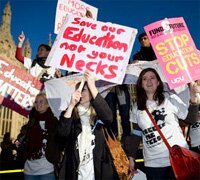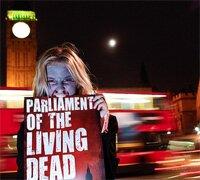2010: The Wrong Target?
A couple of weeks ago at the Labour Party Conference, Gordon Brown pledged to “enshrine in law Labour’s pledge to end child poverty” although the specifics were hazy. The Campaign to End Child Poverty staged a march in central London yesterday, urging the government to spend more on eradicating child poverty.
The campaigners said that next year’s budget is the last opportunity for the Government to invest to ensure it hit its target of halving child poverty by 2010 – A crucial waypoint en route to complete eradication by 2020. However, the campaigners (and likely Gordon Brown too) may be suffering from short-term thinking, a target mentality that makes the longer fight against poverty harder to win. In an article published on Comment is Free earlier this year, Ian Mulheirn from the Social Market Foundation makes the case for scrapping the 2010 target, in favour of a renewed focus on the 2020 goal. While the 2010 goal can be solved by another £3bn in tax credits (the policy the campaigners are marching for), the 2020 goal will be solved by more long-term measures, such as increased, targeted spending on education:
Further spending in pursuit of the 2010 target would divert precious resources into tackling the symptoms of child poverty while neglecting its underlying causes. …
…the 2010 and 2020 poverty targets now represent distinct visions of how to tackle child poverty. As money becomes scarcer, they are increasingly becoming opposing visions. It is clear that the provision of real equality of opportunity, represented by the 2020 target, rather than the palliative of tax credits, should now be the priority.
Cross posted to robertsharp.co.uk, of course.
-------------------------
| Tweet |
Robert Sharp designed the Liberal Conspiracy site. He is the Campaigns Manager at English PEN, a blogger, and a director of digital design company Fifty Nine Productions. For more of this sort of thing, visit Rob's eponymous blog or follow him on Twitter @robertsharp59.
· Other posts by Robert Sharp
Filed under
Blog
17 responses in total ||
Well, I think it’s safest to put the target back to 3020, myself – ie, when Labour is next in government.
Plus – let’s not forget that we’ve still got thousands of poverty-stricken bankers to save before we can turn our attention to all those kiddies out there who were dumb enough to be born in the wrong postcodes.
Priorities, people. Please.
“While the 2010 goal can be solved by another £3bn in tax credits (the policy the campaigners are marching for), the 2020 goal will be solved by more long-term measures, such as increased, targeted spending on education”
The Social Market Foundation are wrong about this. Ending child poverty does require extra spending on services such as education, but it is about poor families having more money, not just better services, it is both/and, not either/or. So increased spending on direct payments, in the form of tax credits or other, is just as important as long-term investment. Donald Hirsh did a very good piece of research for the Joseph Rowntree Foundation on this – http://www.jrf.org.uk/child-poverty/publications.asp#what
It is very sketchy to think that helping families to be able to pay the bills and be able to do the weekly shop is a distraction from ending poverty. And in terms of priorities, just at the moment when the economy is slowing is exactly the right time to put more money in the pockets of lower earners.
No offence meant, Dan, but don’t you think there’s a certain irony in Labour promoting itself as the party to end child poverty when they have actively created it? It’s the same kind of weirdness we’re finding with the financial crisis – Brown created the mess, and is now offering himself as the best person to clean it up. It’s like being the dog and the pooper-scooper all at once. Kooky.
I do think, however, that you’re right to say that some relief is necessary now. Seems very unlikely from this crew, though – 10p tax, anyone?
Hi Kate,
I am an optimist, but I think the Labour government might actually keep the promise and halve child poverty by 2010. It’s definitely a good cause to rally round, there’s more info at http://www.ecpc.org.uk One thing is that it is entirely within the government’s power to halve child poverty by 2010, and whatever you think about the other things that they’ve done, that would be an amazing achievement up there with the best of any (Labour or other) governments.
On Labour ‘actively creating child poverty’, not sure what you mean here. Eighteen years of Tory government massively increased the number of children living in poverty, but since 1999 (when Labour made the pledge), the percentage of children living in poverty has been falling, except for a couple of years between 2005 and 2007. In fact, the same year that the 10p tax rate got scrapped was also the year of above inflation increases in tax credits and child benefit, so that child poverty actually fell overall.
It’s a fair criticism to say that Labour has focused too much on families and pensioners when it comes to tackling poverty, and not enough on single adults without kids, and there is certainly much more needs doing, but ending child poverty is an area where Labour needs to build on and expand on what it has done well, not where it has failed.
Don, if you’re effectively saying that the way to solve child poverty is to end adult poverty then you are already in opposition to this government which says the way to end child poverty is to enslave parents.
Has child poverty been reduced under Labour?
I don’t think that is the case at all. Here’s a recent Guardian article (June) explaining that the gap between rich and poor has increased under Labour, and recording the latest 100,000 jump in numbers of children in poverty:
http://www.guardian.co.uk/society/2008/jun/11/socialexclusion.children
The richest fifth of families were making even more of the money by this time – I remember reading about this at the time, and not being at all confident that Labour was on the right track when it came to reducing poverty for children and pensioners.
And those numbers were taken when the economy was much, much stronger than it is now – surely, with increasing unemployment, negative equity and a government running very short on finance, things are likely to get worse for families at the lower end. I can hardly see how they’ll improve, especially with rising unemployment. Those people won’t even be eligible for tax credits, will they?
Kate – the article you linked to showed that the number of children in poverty since Labour took power had fallen 600,000 (and the number of pensioners fallen by 900,000). For many more stats, have a look at http://www.poverty.org.uk , which is the best independent website on the subject. It takes a bit of time to collect the stats, so the figures from that report are for 2007, and don’t take into account that since then tax credits have risen further.
Obviously, the problems with the economy will mean things will get worse for families on low incomes if the government does nothing – that’s why campaigners want it to spend an extra £3 billion on assistance for families on low incomes.
Parents who are out of work are eligible for Child Tax Credit (there are two main kinds of tax credits – child tax credit and working tax credit), and the spending would also go on higher child benefit.
I wouldn’t be too optimistic about any target being met if the cumbersome, error-strewn Tax Credits system is the intended method of delivery.
Working to reduce the negative effects of benefit cut-off points would be nice for anyone who’s in a similar position to myself – I don’t quite qualify for income support, but as a result miss out on council tax benefit & any mortgage assistance, etc – which actually makes me poorer overall than if I was receiving I.S.
Still, the £12 a month “milk tokens” certainly come in handy!
![]()
“Obviously, the problems with the economy will mean things will get worse for families on low incomes if the government does nothing”
Actually, shouldn’t so-called “relative poverty” (the indicator used by The Poverty Site) improve during a recession if a few of those greedy city workers stay unemployed? I personally think it is an utterly bonkers concept and I wonder why you guys get so concerned about such an arbitrary figure. Rather than talk about “poverty”, why not just call it “equality” and then we can start discussing whether the state either should or is even capable of tackling it.
My heart’s with Kate and my head’s with Nick.
The State can, I think, steer rather than tackle: the limits on its capacity to do the latter are given by
- the mobility of capital and skilled labour;
- the extent to which society is shamed by poverty and wishes to tackle it, as opposed to, say, scapegoating the poor.
The government’s real failing has been to behave as though it can both tackle the problem on its own and be a business-friendly government. If you try to do two things at once you’ll probably fail at both.
One consequence of the “end of ideology” has been the rise of the State as an interest in itself (as opposed to a tool of wicked capitalists or a TUC poodle) – as evidenced by ID cards and the desire to log all internet traffic in the name of “security”. It is hard to think of much that this Government has done of which Bismarck would have disapproved.
I know this may be a little out there but what about reducing child poverty in Britain by thinking of ways to get poor people to have less of them?
Any ideas?
[11] A pedant writes: you mean “fewer”.
***
To the extent that we need to work harder to find ways for teenage girls with IQs in the 80s and 90s to find other sources of self-esteem than pregnancy, I agree. What those might be I don’t know.
You’re right Mike – it is “fewer” but you are wrong in thinking that if we solve teenage pregnancy it will substantially reduce the number of children living in poverty. From the websites mentioned above it seems that they are actually a very small proportion of children living in poverty.
The majority of poor children probably come from single parent homes where mothers (mostly) have more children then they can afford. How can we help them to stop is the real question I suppose.
“Any ideas?”
“To the extent that we need to work harder to find ways for teenage girls with IQs in the 80s and 90s to find other sources of self-esteem than pregnancy, I agree. What those might be I don’t know.”
Well, the Fabian society of last century suggested forced sterilisation, a fairly neat way of dealing with that problem, one which the now sanctified Marie Stopes also approved. It was practiced moderately by that then wonderful “social democracy”, Sweden, into the 1970s. That seems to be the path that some on the left have ended up going down when they really want to get to grips with a problem.
The alternative (both more morally acceptable and economically sensible approach) is to take the Dutch path and provide material benefits for mothers who are unable to support themselves, but provide it in a less attractive than handing out free council houses.
“Any ideas?”
“To the extent that we need to work harder to find ways for teenage girls with IQs in the 80s and 90s to find other sources of self-esteem than pregnancy, I agree. What those might be I don’t know.”
Well, the Fabian society of last century suggested forced sterilisation, a fairly neat way of dealing with that problem, one which the now sanctified Marie Stopes also approved. It was practiced moderately by that then wonderful “social democracy”, Sweden, into the 1970s. That seems to be the path that some on the left have ended up going down when they really want to get to grips with a problem.
The alternative (both more morally acceptable and economically sensible approach) is to take the Dutch path and provide material benefits for mothers who are unable to support themselves, but provide it in a less attractive way than handing out free council houses.
lazy perhaps, but how do the Dutch achieve this? workhouses…?
Hmm, my reply hasn’t appeared. I can’t find a decent primary link but essentially, they provide accomodation to teenaged mothers who can’t support themselves in communal hostels rather than personal flats, or they require them to stay in the family home.
Reactions: Twitter, blogs
Sorry, the comment form is closed at this time.
You can read articles through the front page, via Twitter or RSS feed.
» John Pilger shames himself by attacking feminists over Julian Assange
» Why Labour was right to reject Bob’s drug policy
» Ten myths about housing benefit reforms in London
» What if Superdrug lived up to its name?
» Why we want to ‘recall’ Aaron Porter as NUS President
» Breakthrough in drugs debate as MPs call for full decriminalisation
» Report shows how the promise on NHS spending has been broken
» Why climate talks in Cancun failed miserably
» Why cuts to local councils will be much worse than Tories suggest
» Left unity and the bid to oust Aaron Porter
» The true horror of NHS privatisation is slowly coming out
|
No Comments 26 Comments 15 Comments 4 Comments 15 Comments 47 Comments 39 Comments 34 Comments 19 Comments 33 Comments |
LATEST COMMENTS » Planeshift posted on Ten myths about housing benefit reforms in London » Matt Munro posted on Ten myths about housing benefit reforms in London » Tax The Fat Cats posted on More Vodafone and Topshop protests coming » the a&e charge nurse posted on John Pilger shames himself by attacking feminists over Julian Assange » Sunny Hundal posted on I know how let down Libdems must feel » Sunny Hundal posted on John Pilger shames himself by attacking feminists over Julian Assange » Stuart White posted on I know how let down Libdems must feel » Hamish posted on What if Superdrug lived up to its name? » Vladimir posted on What if Superdrug lived up to its name? » Tim Worstall posted on Ten myths about housing benefit reforms in London » Larry Smith posted on Ten myths about housing benefit reforms in London » Unity posted on John Pilger shames himself by attacking feminists over Julian Assange » Torquil MacNeil posted on John Pilger shames himself by attacking feminists over Julian Assange » Mat M posted on Ten myths about housing benefit reforms in London » Vincenzo Rampulla posted on Ten myths about housing benefit reforms in London |















